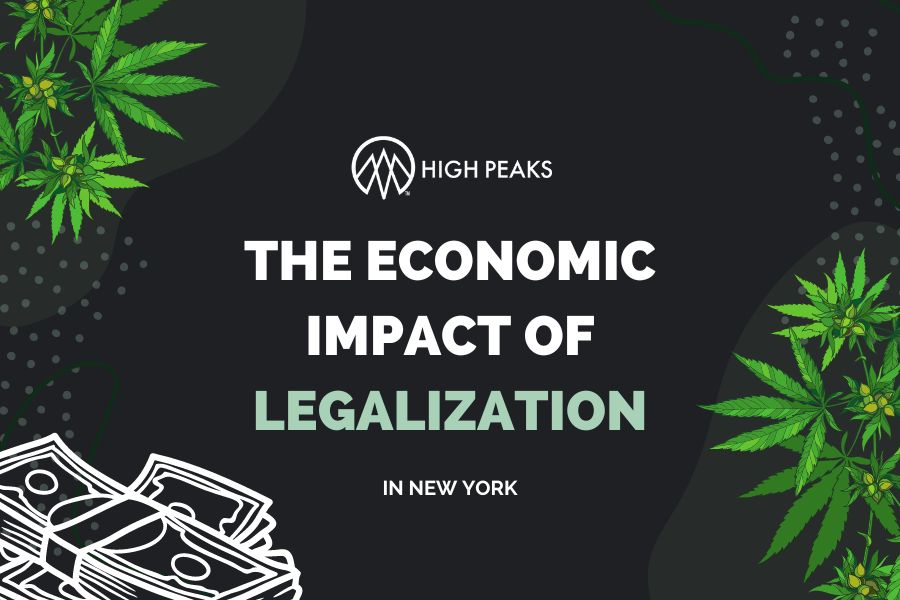Following the legalization of recreational cannabis in New York State in recent years, the state has received a great deal of attention. It has sparked widespread debate across the country, with many speculating on the potential economic impact of this decision. Legalization supporters argue that it will increase job opportunities, generate significant tax revenue, and reduce the burden on law enforcement and the criminal justice system.
Opponents of legalization, on the other hand, are more concerned about the potential negative consequences. Some of the noted concerns include increased drug use, addiction, and impaired driving. Let’s look at the economic impact of cannabis legalization in New York State, taking into account both the potential benefits and drawbacks. In order to provide a comprehensive overview of these implications of this contentious decision, we will analyze projected revenue and job creation figures, as well as the potential impact on public health and safety.
Tax Revenue Generation
Cannabis legalization in New York is expected to generate significant tax revenue for the state. Legalization could generate up to $350 million in annual tax revenue for the state, according to the New York State Department of Health. This money would be raised through sales taxes, cultivation taxes, and excise taxes (set at 9%). The sales tax alone is expected to generate $200 million per year, with the cultivation tax adding another $50 million.
These revenues would then go toward a variety of programs and initiatives. This includes education, drug treatment programs, and law enforcement. Furthermore, it’s expected to generate new job opportunities, boosting the state’s economy even further. Some experts, however, warn that these revenue projections may be overly optimistic. And more than that, the costs of legalization, such as regulation and enforcement, may offset some of the potential benefits. While the economic impact of legalizing cannabis in New York State is unknown, it is clear that tax revenue generation will play a significant role.
Cannabis Industry Job Creation
Cannabis legalization in New York State is also expected to generate new job opportunities, particularly in the cannabis industry. Legalization will enable the establishment of a legal, regulated market for cannabis products, necessitating the creation of a slew of new jobs in fields such as cultivation, processing, distribution, and retail sales. According to the New York State Department of Health, cannabis legalization could generate up to 60,000 new jobs in the state. These positions would range in skill level from entry-level to highly skilled, such as chemists, horticulturists, and marketing professionals. Needless to say, legalization is expected to have a ripple effect on the cannabis industry in addition to creating new jobs.
For example, it’s safe to assume that demand for real estate to house cannabis cultivation facilities and retail stores will increase. As a result, the construction industry stands to benefit. Increased tourism to the state based on legal cannabis may also benefit the hospitality industry. Some experts, however, warn that the number of jobs created may be lower than expected, and that job growth may be concentrated in certain areas of the state. Furthermore, there have been concerns raised about cannabis industry employees’ working conditions and wages, as well as whether these jobs will provide the same level of benefits and protections as other industries. Despite these reservations, legalization of cannabis is expected to have a significant impact on job creation in New York State, opening up new opportunities.
Effects on Public Health and Safety
While the economic benefits of legalizing cannabis in New York State are clear, there are also concerns about the potential impact on public health and safety. Critics of legalization argue that it could lead to increased use and abuse of the drug, as well as increased rates of addiction, impaired driving, and other negative health outcomes. However, supporters of legalization argue that regulation and taxation can actually improve public health outcomes by reducing the prevalence of black market sales and ensuring that products are labeled accurately and free of harmful contaminants. They also point to the potential for tax revenue to fund drug treatment programs and other public health initiatives.
In addition to this, legalization is also expected to reduce the ever present burden on law enforcement. This frees up resources to address more serious crimes and improve public safety overall. However, some experts caution that we may not fully understand the potential impact on public health and safety. Overall, the effects of legalizing cannabis on public health and safety are complex and multifaceted, and will require ongoing study and evaluation to fully understand. While there are legitimate concerns about the potential negative impacts of legalization, there are also potential benefits that could improve public health outcomes and reduce the burden on law enforcement and the criminal justice system.





